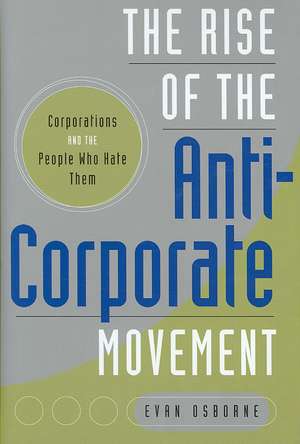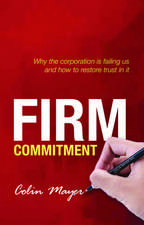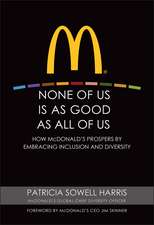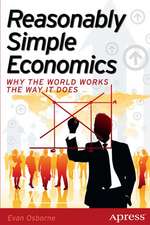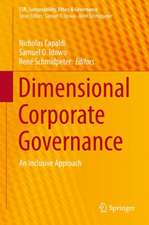The Rise of the Anti-Corporate Movement: Corporations and the People who Hate Them
Autor Evan Osborneen Limba Engleză Hardback – 29 sep 2007 – vârsta până la 17 ani
| Toate formatele și edițiile | Preț | Express |
|---|---|---|
| Paperback (1) | 225.33 lei 3-5 săpt. | |
| Stanford University Press – 25 mar 2009 | 225.33 lei 3-5 săpt. | |
| Hardback (1) | 288.89 lei 6-8 săpt. | |
| Bloomsbury Publishing – 29 sep 2007 | 288.89 lei 6-8 săpt. |
Preț: 288.89 lei
Preț vechi: 350.30 lei
-18% Nou
Puncte Express: 433
Preț estimativ în valută:
55.29€ • 57.51$ • 46.34£
55.29€ • 57.51$ • 46.34£
Carte tipărită la comandă
Livrare economică 14-28 martie
Preluare comenzi: 021 569.72.76
Specificații
ISBN-13: 9780275997861
ISBN-10: 0275997863
Pagini: 264
Dimensiuni: 156 x 235 x 27 mm
Greutate: 0.56 kg
Editura: Bloomsbury Publishing
Colecția Praeger
Locul publicării:New York, United States
ISBN-10: 0275997863
Pagini: 264
Dimensiuni: 156 x 235 x 27 mm
Greutate: 0.56 kg
Editura: Bloomsbury Publishing
Colecția Praeger
Locul publicării:New York, United States
Notă biografică
Evan Osborne is Professor of Economics at Wright State University. He has written for such publications as Journal of Legal Studies, Public Choice, Cato Journal, Journal of Sports Economics, and Economic Development and Cultural Change. Among others, the AP, Reuters, Christian Science Monitor, Newsweek (International), Bloomberg Radio, and Forbes.com have featured his views.
Recenzii
The predominant form of business enterprise in developed economies is the corporation, characterized by limited liability (for the shareholders as owners) and unlimited life (personhood for the corporate form). Proponents of the anticorporate movement (ACM) agree that corporations . have become so powerful that they must be reined in. Osborne marshals the ACM arguments, among them, excessive size and scale; dominance of democracy through political, economic, and social power; monoculture, poor living conditions, and inequality from corporate globalization; and ill effects on human culture. He presents a reasoned, forceful rebuttal to ACM assertions, nevertheless agreeing that corporations are not perfect, nor is government regulation. This work is an antidote to ACM's diverse standpoints and a careful, reasoned rebuttal to its illogic, aversion to data, and intellectual bankruptcy; ACM offers nothing to replace the corporate form of business enterprise. Osborne thus reveals the ACM's misunderstanding or ignorance of economics and political science. Highly recommended. All levels of undergraduate students as well as general readers.
